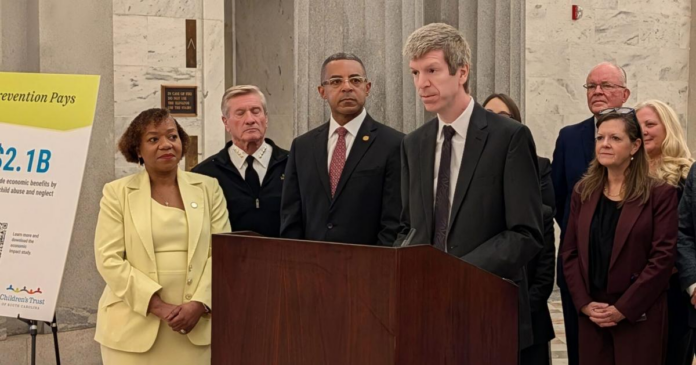COLUMBIA — Child abuse and neglect is often seen purely as a social concern. A new study argues that for South Carolina, it’s a fiscal one as well.
Various risk factors feeding into unstable home lives like poor mental health, divorce and physical, mental and substance abuse can have a tangible effect on the state’s economy to the estimated tune of $74.2 billion per year, a study by the Darla Moore School of Business at the University of South Carolina on behalf of the Children’s Trust of South Carolina found.
Volumes of peer-reviewed research have long-established a connection between so-called “adverse child experiences,” or ACEs, and heightened risk of unemployment, poverty and low educational attainment, which all translate to lowered workforce productivity.
Other more recent studies have found a correlation between a high number of ACEs and individuals’ risk for serious health conditions and later substance abuse which, according to estimates by the American Medical Association, prove to be a drag to state medical systems to the tune of about $1.7 billion annually.
South Carolina, which currently ranks 34th in the nation for rates of childhood abuse and neglect, is particularly prone to those concerns.
“We can clearly see that child abuse and neglect impose enormous costs on South Carolina, including very specific economic costs that we can quantify,” lead author Joseph Von Nessen said Nov. 19 during a press conference at the statehouse.
Trauma everywhere
Some 58 percent of all working-age adults in the Palmetto State experienced some form of adverse childhood experience from household mental illness and divorce to emotional, physical or sexual abuse. In some South Carolina counties, the prevalence of adults with four or more of those experiences in their lifetimes can be as high as 9.2 percent, as was seen in Clarendon and Barnwell counties.
Childhood traumas, researchers say, often ripple into adulthood. And as adults, the estimated loss accrued across factors like unrealized earning potential, welfare dependence, unemployment and housing insecurity can equate to higher levels of government spending and lowered economic activity — a social drain on the state that is costing South Carolina billions in lost productivity and avoidable medical spending.
Adults who experience at least one ACE can expect to earn roughly 14 percent less on average, Von Nessen said, while frequent victims of child abuse report workplace absenteeism at rates about twice the national average.
Bleaker still is that the investigation failed to demonstrate any clear pattern across the state.
While rural and highly impoverished Clarendon County ranked highest for the number of adults with four or more adverse childhood experiences, it only narrowly outpaced the more urban/suburban Richland County, where nearly 9 percent of adults counted four or more of those experiences.
Some counties are more susceptible to some types of trauma than others. Dorchester County, for example, saw the state’s highest rates for emotional and physical abuse while Lee and Union counties saw incidences of sex abuse roughly double the statewide average.
Dispersed need, sparse resources
Researchers emphasized that child abuse was a statewide challenge that impacted rural and urban areas equally, with no single policy solution to mitigate it.
Wednesday’s press conference promoting the study tied into a push for additional funding for the Children’s Trust of South Carolina, a non-profit organization which spends some $20 million annually on various family strengthening initiatives encompassing home visits for parents of young children to community-based resources for counseling, food assistance and mental health services.
Advocates for the Children’s Trust said a one-time infusion of $10 million by the General Assembly — as well as an additional $1 million in annual funding — could allow them to sustain that philanthropic effort long-term, with an eye toward mitigating potential harms before they take root.
“Prevention is proactive policy,” said Rep. Paula Rawl Calhoon, a Lexington County Republican who serves on the House Judiciary Committee.
Less known is whether the non-profit community can fully absorb the need, much less whether state government is willing or able to front the long-term, upfront costs for the comprehensive social services necessary to negate the economic drain.
Approximately 43 of 46 South Carolina counties are considered mental health professional shortage areas, according to the Medical University of South Carolina, with those living in those areas served by a patchwork of private and non-profit providers insufficient to meet existing needs.
And while state data show substance abuse rates among adults fell among numerous categories in 2024, the most recent data from the South Carolina Office for Healthcare Workforce identified substantial shortages in social workers and other behavioral health specialists to mitigate risk factors contributing to adverse childhood experiences, aligning with national trends.
The state Department of Social Services has seen its budget grow to address the need, including the addition of some 700 child welfare case managers over the past decade, according to state budget documents.
But while DSS has improved in recent years, Martha Edwards — chair of the South Carolina Chapter of the American Academy of Pediatrics — said it’s grown largely to contain the growing need that exists, rather than working holistically to mitigate problems in the home before they take root.



